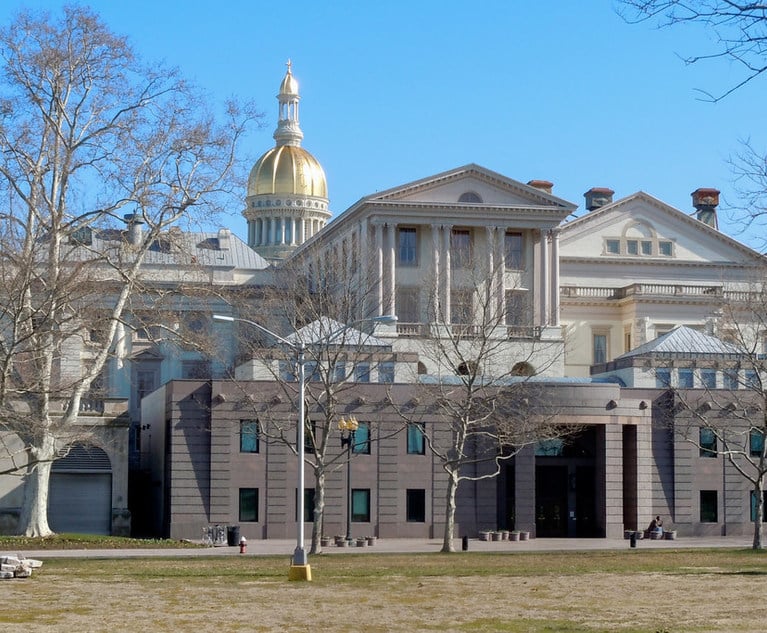Court Deftly Balanced Access and Confidentiality in OPRA Ruling
Our Supreme Court's recent interpretation of the Open Public Records Act in Paff v. Galloway Twp. applies enhances public access on the one hand while preserving OPRA's confidentiality-preserving exceptions on the other.
July 21, 2017 at 05:10 PM
8 minute read
Our Supreme Court's recent interpretation of the Open Public Records Act in Paff v. Galloway Twp. applies OPRA to the type of data evaluation known as “traffic analysis.” The opinion enhances public access on the one hand while preserving OPRA's confidentiality-preserving exceptions on the other.
The plaintiff in Paff filed an OPRA request for emails to or from the township's chief of police and township clerk during a specific two-week period. He did not request the emails themselves. Instead he requested that the township provide him with a chart, in the format he submitted, showing the fields from each email's header, sender, recipient, date, and subject matter line. Although the township had provided similar charts in the past, it refused to do so, relying on informal guidance from the Government Records Council that OPRA does not require a government agency to create records that do not already exist. Reversing the Appellate Division, the Supreme Court held that the creation of new records was not involved, but rather the sorting of data in existing electronic records. “By OPRA's language,” it said, “information in electronic form, even if part of a larger document, is itself a public record.” The court noted that N.J.S.A. 47A:1-5(d) allowed municipalities to charge services fees when response to a request “entails a substantial amount of manipulation or programming of information technology.” From this language, it inferred a legislative intent that the “manipulation or programming of information technology” used to extract the header information was not the creation of a new record but the disclosure of part of an existing one. It disposed of the GRC's contrary guidance by noting: first, that the GRC had disclaimed giving legal advice and, second, that because OPRA declares even the GRC's formal decisions to be non-precedential and not binding on the courts, its informal advice a fortiori did not warrant deference.
Why did Paff request only header information and not the contents of the emails? His testimony in the trial court was disingenuous. Paff testified that he was simply trying to protect the public's right to know, couldn't recall why he had chosen the dates in question, and may have been just testing the township's disclosure policy. A representative of the township's police department certified that the dates related to an internal investigation in the police department and that disclosure of the header information would affect the confidentiality of that investigation.
This content has been archived. It is available through our partners, LexisNexis® and Bloomberg Law.
To view this content, please continue to their sites.
Not a Lexis Subscriber?
Subscribe Now
Not a Bloomberg Law Subscriber?
Subscribe Now
NOT FOR REPRINT
© 2025 ALM Global, LLC, All Rights Reserved. Request academic re-use from www.copyright.com. All other uses, submit a request to [email protected]. For more information visit Asset & Logo Licensing.
You Might Like
View All



Appellate Division Strikes Down Government Records Council's Regulation During Pending Denial-of-Access Complaint
4 minute readTrending Stories
- 1Exits Leave American Airlines, SiriusXM, Spotify Searching for New Legal Chiefs
- 2Etsy App Infringes on Storage, Retrieval Patents, New Suit Claims
- 3The Secret Prior Art Problem Rears Its Ugly Head
- 4Four Things to Know About Florida’s New Law to Protect Minors Online
- 5US Supreme Court Considers Further Narrowing of Federal Fraud Statutes
Who Got The Work
J. Brugh Lower of Gibbons has entered an appearance for industrial equipment supplier Devco Corporation in a pending trademark infringement lawsuit. The suit, accusing the defendant of selling knock-off Graco products, was filed Dec. 18 in New Jersey District Court by Rivkin Radler on behalf of Graco Inc. and Graco Minnesota. The case, assigned to U.S. District Judge Zahid N. Quraishi, is 3:24-cv-11294, Graco Inc. et al v. Devco Corporation.
Who Got The Work
Rebecca Maller-Stein and Kent A. Yalowitz of Arnold & Porter Kaye Scholer have entered their appearances for Hanaco Venture Capital and its executives, Lior Prosor and David Frankel, in a pending securities lawsuit. The action, filed on Dec. 24 in New York Southern District Court by Zell, Aron & Co. on behalf of Goldeneye Advisors, accuses the defendants of negligently and fraudulently managing the plaintiff's $1 million investment. The case, assigned to U.S. District Judge Vernon S. Broderick, is 1:24-cv-09918, Goldeneye Advisors, LLC v. Hanaco Venture Capital, Ltd. et al.
Who Got The Work
Attorneys from A&O Shearman has stepped in as defense counsel for Toronto-Dominion Bank and other defendants in a pending securities class action. The suit, filed Dec. 11 in New York Southern District Court by Bleichmar Fonti & Auld, accuses the defendants of concealing the bank's 'pervasive' deficiencies in regards to its compliance with the Bank Secrecy Act and the quality of its anti-money laundering controls. The case, assigned to U.S. District Judge Arun Subramanian, is 1:24-cv-09445, Gonzalez v. The Toronto-Dominion Bank et al.
Who Got The Work
Crown Castle International, a Pennsylvania company providing shared communications infrastructure, has turned to Luke D. Wolf of Gordon Rees Scully Mansukhani to fend off a pending breach-of-contract lawsuit. The court action, filed Nov. 25 in Michigan Eastern District Court by Hooper Hathaway PC on behalf of The Town Residences LLC, accuses Crown Castle of failing to transfer approximately $30,000 in utility payments from T-Mobile in breach of a roof-top lease and assignment agreement. The case, assigned to U.S. District Judge Susan K. Declercq, is 2:24-cv-13131, The Town Residences LLC v. T-Mobile US, Inc. et al.
Who Got The Work
Wilfred P. Coronato and Daniel M. Schwartz of McCarter & English have stepped in as defense counsel to Electrolux Home Products Inc. in a pending product liability lawsuit. The court action, filed Nov. 26 in New York Eastern District Court by Poulos Lopiccolo PC and Nagel Rice LLP on behalf of David Stern, alleges that the defendant's refrigerators’ drawers and shelving repeatedly break and fall apart within months after purchase. The case, assigned to U.S. District Judge Joan M. Azrack, is 2:24-cv-08204, Stern v. Electrolux Home Products, Inc.
Featured Firms
Law Offices of Gary Martin Hays & Associates, P.C.
(470) 294-1674
Law Offices of Mark E. Salomone
(857) 444-6468
Smith & Hassler
(713) 739-1250






